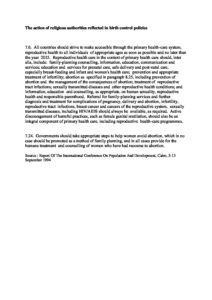7.6. All countries should strive to make accessible through the primary health-care system, reproductive health to all individuals of appropriate ages as soon as possible and no later than the year 2015. Reproductive health care in the context of primary health care should, inter alia, include: family-planning counselling, information, education, communication and services; education and services for prenatal care, safe delivery and post-natal care, especially breast-feeding and infant and women’s health care; prevention and appropriate treatment of infertility; abortion as specified in paragraph 8.25, including prevention of abortion and the management of the consequences of abortion; treatment of reproductive tract infections; sexually transmitted diseases and other reproductive health conditions; and information, education and counselling, as appropriate, on human sexuality, reproductive health and responsible parenthood. Referral for family-planning services and further diagnosis and treatment for complications of pregnancy, delivery and abortion, infertility, reproductive tract infections, breast cancer and cancers of the reproductive system, sexually transmitted diseases, including HIV/AIDS should always be available, as required. Active discouragement of harmful practices, such as female genital mutilation, should also be an integral component of primary health care, including reproductive health-care programmes.
7.24. Governments should take appropriate steps to help women avoid abortion, which in no case should be promoted as a method of family planning, and in all cases provide for the humane treatment and counselling of women who have had recourse to abortion.
